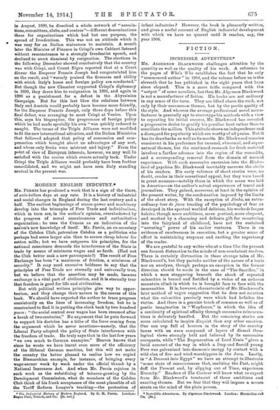FICTION.
INCREDIBLE ADVENTURES.*
Mn. ALGERNON BLACKWOOD challenges attention by the quantity as well as the quality of his work. A reference to the pages of Who's Who establishes the fact that he only "commenced author " in 1906, and the volume before us is the eleventh that he has published in the eight years that have since elapsed. This is a mere trifle compared with the "output " of some novelists, but then Mr. Algernon Black wood is not a manufacturer of fiction. His books are not ordinary in any sense of the term. They are lifted above the nick, not only by their uncommon themes, but by the poetic quality of the style. And whereas the average professional novel manu- facturer is generally apt to stereotype his methods with a view to repeating his initial success, Mr. Blackwood has revealed a progressive desire to gratify his peculiar bent rather than to conciliate the million. This attitude shows an independence and a disregard for popularity which are worthy of all praise. But it has its drawbacks as well as its merits. Mr. Blackwood remains consistent in his preference for unusual, abnormal, and super- natural themes, but the continued research for fresh material involves a further advance into the region of the recondite, and a corresponding removal from the domain of normal experience. With each successive excursion into the Hinter- land of psychics Mr. Blackwood inevitably narrows the circle of his readers. His early volumes of short stories were, no doubt, cruder in their sensational appeal, but they were based in great measure—notably those in which the scene was laid in America—on the author's actual experiences of travel and journalism. They gained, moreover, at least in the opinion of the present writer, by the condensation imposed by the limits of the short story. With the exception of limbo, an extra- ordinary tour de force treating of the psychology of fear as developed in the spectral world of delirium, his works de longue haleine, though more ambitious, more poetical, more eloquent, and marked by a charming and delicate gift for re-entering into the fairyland of childhood, have not the sustained " arresting " power of his earlier ventures. There is on evidence of carelessness in execution, but a greater sense of effort in maintaining suspense and exciting the expectancy of the reader.
We are grateful to any writer who at a time like the present can furnish distraction to the minds of non-combatant readers. There is certainly distraction in these strange tales of Mr. Blackwood's, but they partake neither of the nature of a tonic nor an anodyne, though perhaps an exception in the former direction should be made in the case of "The Sacrifice," in which a man staggering beneath the shock of repeated calamities is braced and fortified by a vision of an arduous mountain climb in which he is brought face to face with the immensities. It is, however, characteristic of Mr. Blackwood's later method of vague suggestion that he does not mention what the calamities precisely were which had befallen the victim. And there is a genuine touch of romance as well as of poetic imagination in "Wayfarers," in which the idea of a continuity of spiritual affinity through successive reincarna- tions is delicately handled. But the remaining stories are more calculated to inspire disquiet than any other emotion. One can sup full of horrors in the story of the country house with an aura composed of layers of dismal theo- logical views strongly held and believed by its successive occupants, while " The Regeneration of Lord Ernie " gives a, lurid account of the way in which a limp and flaccid young Peer was galvanized into daemonic energy by contact with a wild clan of fire- and wind-worshippers in the Jura. Lastly, in"A Descent into Egypt" we have an attempt to illustrate "some state of consciousness that, realizing the Past, might doff the Present and, by slipping out of Time, experience Eternity." Readers of The Centaur will know what to expect from Mr. Blackwood's treatment of those ambitious and exacting themes. But we fear that they will impose a severe strain on the mind of the plain person.
• Incredible Adventures. By Algernon Blackwood. London: Macmillan and Co. [8s.]






































 Previous page
Previous page